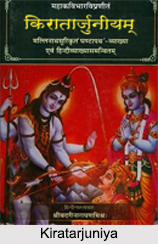 Kiratarjuniya is a Sanskrit epic written in the 6th century by Bharavi. It is his only recognized work. It is an epic poem with eighteen cantos in which Lord Shiva tests the power of Arjuna, one of the Pandavas in Mahabharata. It is one of the six Sanskrit "mahakavyas", or great epics. It is considered to be the most powerful poem in Sanskrit language.
Kiratarjuniya is a Sanskrit epic written in the 6th century by Bharavi. It is his only recognized work. It is an epic poem with eighteen cantos in which Lord Shiva tests the power of Arjuna, one of the Pandavas in Mahabharata. It is one of the six Sanskrit "mahakavyas", or great epics. It is considered to be the most powerful poem in Sanskrit language.
Plot of Kiratarjuniya
Kiratarjuniya was based on an episode from the third "parva" or section, of the long Sanskrit epic Mahabharata. Bharavi explained the Pandava prince Arjuna"s ensuing battle with Kirata, a wild mountaineer in 18 cantos. Kirata in the end was proved to be Lord Shiva. Arjuna, with the instruction of Indra, propitiates Lord Shiva with self-punishment in the forest. When a demon named Muka in the shape of a wild boar charged towards Arjuna, Lord Shiva appeared in the form of Kirata. Arjuna and Kirata at the same time shot an arrow on the boar and killed it. They disagreed over who shot first and a fight resulted. They fight for a long time and Arjuna was shocked as he could not triumph over Kirata. Finally, he recognised Kirata was Lord Shiva. For his courage and self-punishment, Shiva awarded Arjuna with a desirable weapon of the "Pashupata" which afterwards helped him against Jayadratha and the Kauravas during the Kurukshetra war in Mahabharata.
Cantos of Kiratarjuniya
Kiratarjuniya develops upon a small episode in the "Vana Parva" in Mahabharata while Pandavas were banished in forest.
•In the first canto, a secret agent of the banished king Yudhisthir arrived and informed him of the activities of the Kauravas.
•In the second canto, Bhima supported Draupadi and pointed out that it would be disgraceful to accept their empire back as a substitute gift of winning it in battle. Yudhisthir refused Bhima and Draupadi"s suggestion.
•In the third canto, sage Vyasa pointed out that the opponent of Pandavas was stronger, and they must use their time in taking actions that would help them to win the battle. He instructed Arjuna to practise "ascetism" and propitiate Indra to attain heavenly weapons for the final war which continues in the fourth canto.
•In fifth canto, Arjuna, was led by a "Yaksha" to the Indrakila peak and started his strong "ascetism".
•In the meantime, in the sixth canto, a heavenly army of maidens (apsaras) set out from heaven, in order to divert Arjuna.
•The seventh canto depicts their road through the heavens and
•In the eighth canto, the maidens reached on top of the Indrakila Mountain.
•The ninth canto explains night with the celebrations and
•In the tenth canto, the maidens attempted to divert Arjuna and failed.
•Finally, in the eleventh canto, Indra arrived as a sage, praised Arjuna"s asceticism. Indra was pleased and revealed himself and asked him to worship Shiva.
•In the twelfth canto, Arjuna started strict austerities, and Shiva took the form of Kirata and arrived to meet Arjuna.
•In the thirteenth canto, they both shot the boar.
•In the remaining five cantos, Arjuna and Shiva battled, Arjuna failed and at last he realised Kirata was lord Shiva.
Linguistic Originality of Kiratarjuniya
Kiratarjuniya is famous for its briefness, depth and verbal involvedness. The narrative of Kiratarjuniya is secondary to the connected descriptions, detailed metaphors and similes in the Sanskrit language. The first Western translation of Kiratarjuniya was by Carl Cappeller into German, published by the Harvard Oriental Series in 1912. There have since been six or more one-sided translations into English.
Kiratarjuniya is a very famous story in the Mahabharata. The two main characters in the story are Kirata (Shiva) and Arjuna. Bharavi rose to fame and became eternal with classical Sanskrit Epic poem Kiratarjuniya.



















